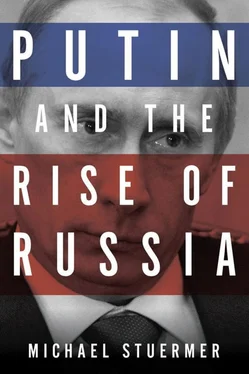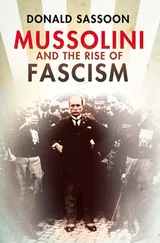On the two-hour flight from Moscow’s ultramodern Domodedovo airport I had recalled earlier encounters with the man who in the autumn of 2007 was, without any doubt, the commanding presence of modern Russia and who, despite all the dissonant advice from his entourage and the vast popularity he enjoyed, intended to abide by the constitution and part with the presidency after his second term. Meanwhile, how he would exit, and where to, was something he kept to himself. He reminded many people of a chess-player who looks many moves ahead and would find it unwise to commit himself to one particular combination sixteen moves away. There were many options, and Moscow was awash with rumour and speculation. But one option, to simply see a willing United Russia party change the constitution and extend his tenure, or open the chance for a consecutive third term, had been firmly excluded. He probably meant what he said, and sometimes repeated: ‘I shall leave the Kremlin, but not Russia.’ And, a little more precisely: ‘I cannot imagine that the Russian people would easily want to do without my experience and authority.’
In those September days of 2007 the guessing had not yet come to an end – let alone to a firm conclusion. The top positions in Russian politics can be redefined, modifying, for instance, the presidential system in a way that resembles more the British or German model centring on the authority of the premier. Yes, no doubt, Putin plays with the idea of leading United Russia, the Kremlin party, while at the same time staying, as befits the Tsar, above party. He might for a while be a more powerful prime minister only to return to full presidential honours and powers. But can Russia live with two tsars at the same time, one, to borrow Sir Walter Bagehot’s famous phrase about the English constitution, representing the ‘dignified parts’ of the constitution, the other the ‘efficient parts’? One in the Kremlin, and one in Moscow’s White House? And for how long would a stopgap tsar be content with nothing but the mantle of power, and not its hard core? Putin will keep his distance from partisan politics. In Russian mythology the Tsar cannot and will not take sides. He is above everything mundane, answering only to Mother Russia and to those heavenly forces represented by the gilt St Andrew crosses scraping the sky over the Kremlin – while piercing the defeated Islamic crescent underneath.
As I was flying in the direction of Sochi my thoughts went back to a memorable evening in 1992 in the Rheingau. Princess Tatiana Metternich, née Vassilchikov, had invited a number of industrialists and politicians to the Palace of Johannisberg, a former monastery secularized in 1803 which the Austrian Emperor had given to Prince Metternich, of Vienna Congress fame, together with the fabulous Riesling vineyards beneath the well-kept Abbot’s residence. When it comes to German Riesling wines Johannisberg sets an absolute standard of both finesse and strength.
A Russian princess who fled revolutionary turmoil in 1917, first to Kiev and then on to Berlin, Tatiana Metternich had never given up the idea of the eternal Russia, very different from the bloody mess the Bolsheviks had created. In Berlin in the 1930s she had been a celebrated beauty, and some decades later she still radiated a distinctly ancien régime charm – while also being an eminently practical organizer of the Rheingau festival, a manager of the estate and a great hostess. Ever since the Soviet Union collapsed, she did everything she could to introduce the standard-bearers of a Western-oriented Russia to German industrial and political leaders.
This is how that memorable evening at Johannisberg had come about. Guest of honour was Professor Anatoli Sobchak, elected mayor of Leningrad, the very city that had just been renamed St Petersburg in a highly symbolic gesture – a gesture, however, for what? Certainly a rejection of Lenin and his brutal regime, but what was to come instead? The answer was open then and will remain open for a long time to come. Sobchak was a constitutional lawyer, arguing in St Petersburg and beyond for the creation of a parliamentary system instead of an ersatz tsar. Highly respected as being untainted by the past and above any suspicion of corruption, he was rumoured to be one of the future leaders of post-communist Russia. The princess had also invited Rolf Magener, then chairman of the overseeing board of BASF, the chemical giant of Ludwigshafen on the Rhine, whom I knew through the international council of the JP Morgan Bank, and Professor Hans Lutz Merkle, legendary former CEO of the House of Bosch, second successor only to the founder Robert Bosch. On the commanding heights of Germany Inc. Merkle was known as the Godfather, and a telephone call from him was enough to settle many a question. Among the numerous public offices he held, he was also president of the Stiftung Wissenschaft und Politik in Ebenhausen, where I had been director since 1988. And then there was a youngish-looking man of indeterminate age and light blue eyes, whom Sobchak introduced, in English, as a member of the administration of St Petersburg. His task, obviously, was to help with the translation. His German was remarkably good, and I remembered having met a few KGB officers whose English was flawless, Etonian. Meanwhile, the man in the grey suit contributed little to the conversation that ranged across Russia’s past and possible future. His name, Vladimir Putin, did not ring any bells – noticed and forgotten.
Two years on there came an invitation from the Bergedorfer Gesprächskreis, a kind of movable think tank of great repute for plain speaking, especially between West Germans and Russians. A meeting took place in St Petersburg, in the snow-covered guesthouse of the city government, still presided over by Professor Sobchak. The subject was, naturally, the future of Russia after the Soviet Union’s demise, debated by the German hosts and their American, British, French and Russian guests. It was remarkable how little attention was focused on the reasons for the decline and fall of the Soviet Union – not unimportant for any predictions about Russia’s future. Instead, the agenda listed economic reform, industrial modernization, eastern enlargement of the European Community, the future of the North Atlantic Alliance, its role after the Cold War and its future borders. Around the table there were about thirty participants, among them, next to Professor Sobchak in the chair, the man in the grey flannel suit whom nobody knew. I remembered, however, Princess Metternich’s invitation to Johannisberg Castle. The mysterious man, by now in charge of the foreign dossier in the St Petersburg city government, listened attentively without saying a word until the discussion touched what the Russians by that time called – in ominous vagueness – their ‘Near Abroad’. What was meant were the lost provinces of the empire to the south and west. Clearly, the wisdom of the Western experts assembled around the table failed to impress Mr Putin. He must have found some of the opinions expressed about the saviour role of the European Community and stabilization through NATO rather provocative. When he took the microphone he made no bones about his dissenting views, saying that there were around 20 million Russians now living on the wrong side of the border. ‘For us, their fate is a question of war and peace.’ Such outspokenness was unusual among the mild-tempered people gathered around the table, and all the more memorable. Was this the authentic voice of the new Russia? And how much weight should be attributed to this kind of outburst? At any rate, most of those present made a note of the name: Vladimir Putin.
In 2001, having been promoted by Boris Yeltsin to chief of intelligence and prime minister, and by now president of Russia and master of the Kremlin, Putin came to Berlin. In the reconstructed Reichstag building the Bundestag held a plenary session, and Putin addressed the German parliament in his near-perfect German. It was the time of the Fischer-Schröder coalition government. He talked, as might have been expected, about Russia’s relations with Western Europe in general and with Germany in particular – with little sympathy reserved for the US and their presence as a European power. The price of oil had been steadily rising for a long time, almost without interruption, and the price of gas followed suit. Nobody knew better than Putin, who in 1997 had presented his doctoral dissertation on the role of energy in the reconstruction of Russia’s place in the world, that fortune had dealt him a glorious hand of cards, and that the oil bonanza could be translated into political power and influence.
Читать дальше











